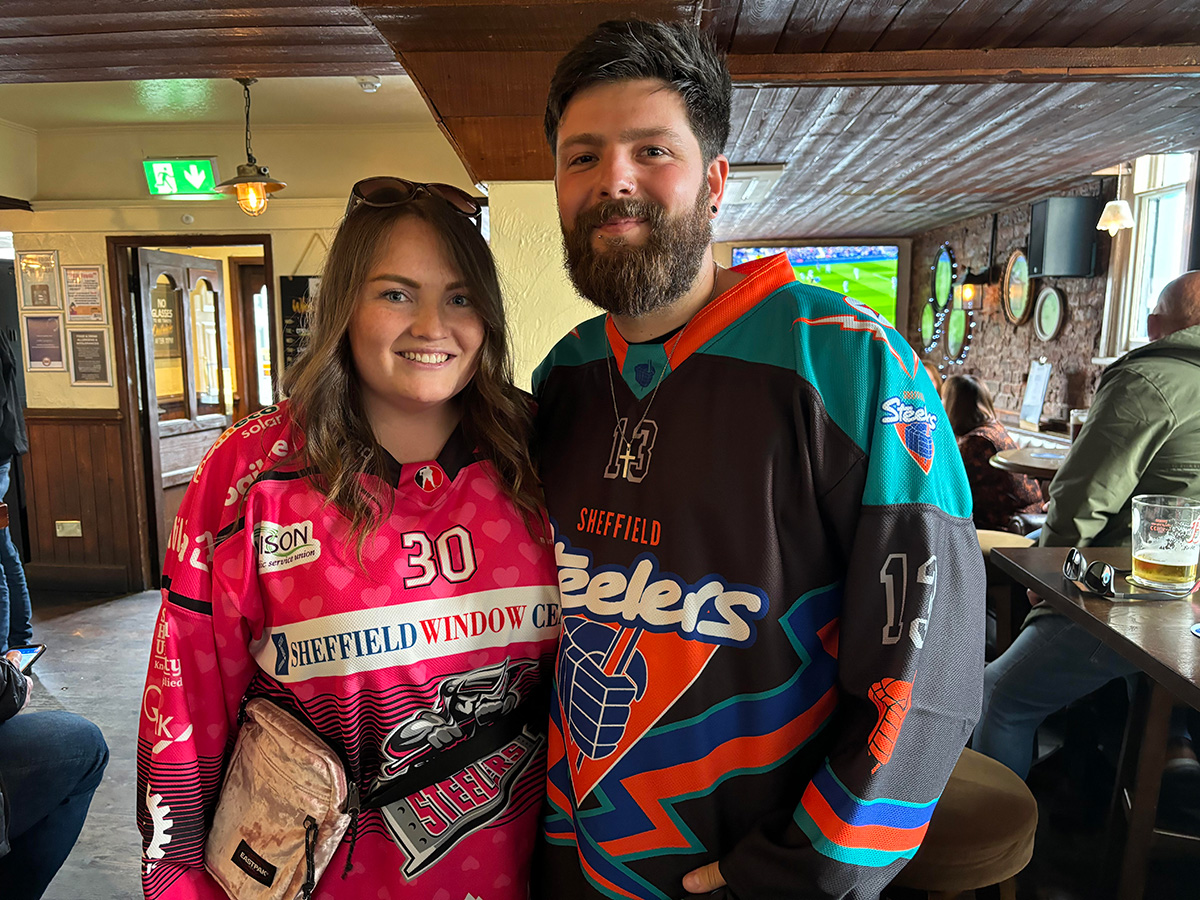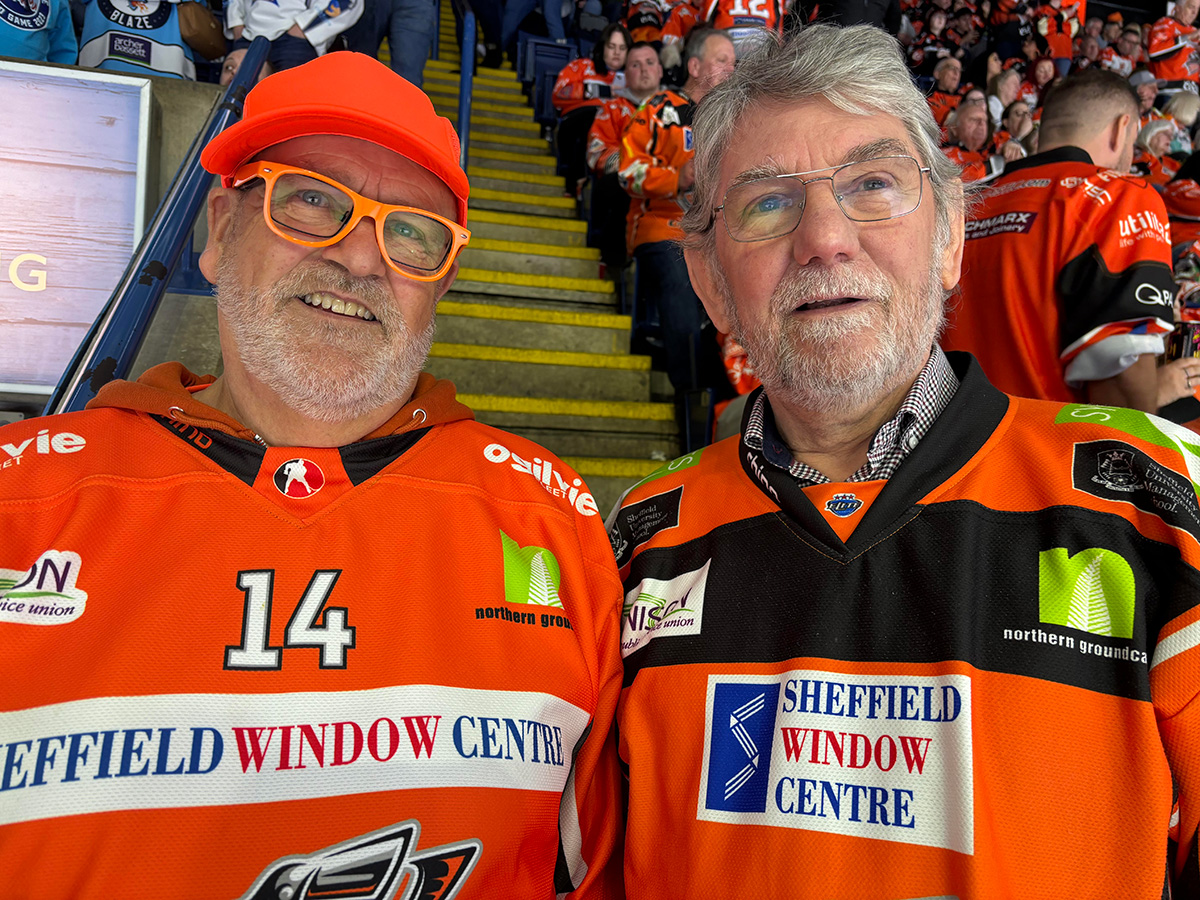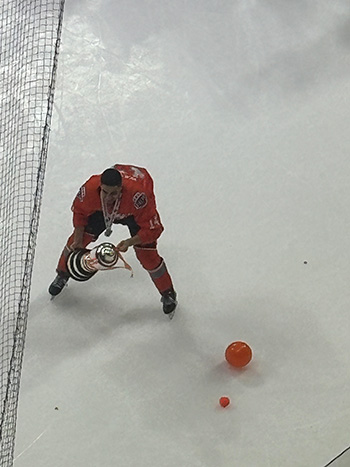The day I left Winnipeg after being on the spot for the introduction of Jets 2.0, in 2009, every section of the local paper had a story on the team. Every one, not just sports. On Saturday, April 20th, when I opened the British papers expecting to find something about the EIHL (Elite Ice Hockey League) Playoff weekend, I found exactly nothing.
There was a lot about soccer/football. There were tables and results of horse races. There was even a piece about the comeback of a snooker champion. Not technically a sport, but we could have that argument about NASCAR too, couldn’t we
But about hockey, not a word. Partly, this is because, measured against the NHL playoffs, the EIHL road to the championship is short. Just a weekend of quarter finals to get eight teams down to four for the “Finals Weekend,” conducted for the past several years, and signed for a handful more to come, in Nottingham. This year, the four teams that made the weekend were the Sheffield Steelers, Guildford Flames, Belfast Giants, and Cardiff Devils. Belfast was last year’s winner.
So it’s a short tournament, but no less intense for that, because if you lose your game on Saturday, you’re automatically playing for third in the table on Sunday. Win on Saturday, conversely, and it’s off to the championship game for you. The schedule was 3pm and 7pm Saturday, 1pm and 5pm Sunday. So that’s it. No big buildup like in the NHL playoffs. Fan Andy explained that that’s because this is not all that matters to English fans. They would, in fact rather win the league than these playoffs.
He made a good comparison, saying, it’s “like the Magic Weekend we have in England for rugby, where everyone just goes for the sake of it. Everybody’s there to have a little bit of fun. We’re all there to enjoy ourselves. Nobody’s there to dislike anybody.”
He elaborated, “In other sports, like football, there’s a massive rivalry. People dislike one another. [In the hockey league] once the playoffs come, we’ve already decided who’s won. This is just a last hurrah for the end of the season.”

Motorpoint Arena was chock-full on Saturday—twice, and again on Sunday. The biggest representation of fans came from Sheffield, and they were loud, singing songs not prompted by the stadium music, but seemingly spontaneously rendered by the crowd. This went on in groups outside the arena and in massive quantities of people inside. The tickets sell in blocks to fans of the same team, so in this case, half the arena was a huge orange Sheffield swath, complete with lots of accessories—pompoms, streamers, and other things to wave.
Sports may be the same on the field/pitch/rink when played in different countries, but the experience of the game—all that happens when play is not on—can differ remarkably. That is especially true in places where the game presentation team is not working in hyper-drive, as it is in NHL arenas all the time. Ever wonder why you hear the same promo every-third period, 10-minute break? (You would notice this only if you went to enough games to be able to recite what comes at the next whistle. I’ve covered more than 700 NHL games, so I think I can speak to this authoritatively.) To answer the above question, it’s because they’re following a script.
In England, at least, and perhaps all of Europe, hockey is the province of the fans. It’s not some corporate sponsor’s call what will happen at the next break. It’s the fans who decide what to sing or chant, or at least it appears that way. To test this theory, I observed from a distance what the rowdy and committed Sheffield Steelers fans were up to. When goals, or good plays, or other things that got their dander up, happened, they seemed to respond on cue as one.
I went and walked amongst them, asking a couple of guys who seemed into it to explain what was said and why. My first theory was that it was like what happens at a football (soccer) game.
“No, it’s not at all like that,” said Steelers fan David. “We do a lot of chants, but they’re in fun, good natured. At a football match, the fans of opposite teams really don’t like each other.” This sounded like what Andy had earlier told me.
So what’s an example of a fun cheer? David again: “When we score a goal. We say ‘Whoosh—it’s behind you’ to the opposing goalkeeper.”
Actually it’s more than that. It’s more ritualistic and extended. It goes, “Whoosh…whoosh…whoosh…it’s behind you.” With each “Whoosh” being accompanied by an arm gesture that kind of starts at the waist and swings outward and upward, with the arms reaching to head level in the last “whoosh.” This is generally repeated several times after the team in question scores a goal. I wonder if the goalies hear it in their sleep?

There are songs, too. Who leads them? “Some guy will start them,” David says, making a vague gesture up and behind him at the packed Sheffield supporters’ sections. “No one is particularly in charge.” When I told him that about as far as it goes in an NHL arena is “Go Habs Go!” Or “Go Leafs Go!” he just looked at me, perhaps a slight note of pity in his eyes. Clearly the ritualistic group bonding experienced in English hockey arenas beats what we North Americans experience.
I get more information from two Sheffield supporters on the street the morning of the Final game. Alessio Gottardo tells me that another chant is “Aaron Fox’s barmy army,” which honors the team’s “manager” (coach). Further, “We are number one,” and because the Steelers won the league and the in-season Challenge Cup, they have “Championes” and “Best team in Yorkshire.” That night as they play in the Final game, and win it, I hear it. “Aaron Fox’s barmay armay” it sounds like, with emphass placed on the last two words. What’s “barmy” mean? Frothy, but it’s applied more particularly to sports fandom related to people who follow Cricket in England.
Alessio said that the situation in this neutral arena is a little bit different from at home, where drummers set the beat and the crowd knows what to chant given the rhythm they lay down. Here, anyone can start a chant. Someone has to step up and do it.
 Another aspect of hockey fandom in Britain is dress-up, or what is called in modern language “cos-play.” Outside the arena, the scene looks like Comic Con. Adults of all stripes don wigs, makeup, leggings of various descriptions, and other accessories to glam up their hockey sweaters. In fact, if you were guessing, you’d say that the sweater is minimum-level requirement. Extra points go for all the other bling.
Another aspect of hockey fandom in Britain is dress-up, or what is called in modern language “cos-play.” Outside the arena, the scene looks like Comic Con. Adults of all stripes don wigs, makeup, leggings of various descriptions, and other accessories to glam up their hockey sweaters. In fact, if you were guessing, you’d say that the sweater is minimum-level requirement. Extra points go for all the other bling.
Just a theory here: these hockey sweaters have a ridiculous amount of corporate logos emblazoned on every inch (way more even than what appears on player game sweaters). Maybe the accessories are the faithful’s way of seizing their team back from corporate capitalism, putting a personal stamp on their fandom that those logos try to deny them.
Too analytical? “Signs, signs, everywhere there are signs,” as the old song says. And the signs I read when analyzing the entire all-encompassing weekend scene in Nottingham all point to fun and camaraderie on a grand scale. Maybe it helps that the city of Nottingham has just enough bars and pubs to accommodate crowds, but not so many that they don’t feel happily full of revelers.
In the end, Sheffield beat Belfast to win and complete the trio of the Championship weekend, the League Table, and the in-season Challenge Cup. Fans stayed a long time after the game to watch their players skate the cup, but even that was done differently. Each player in turn took it, skated forward, and held it low between his knees. Then as he got near the boards on the fans’ side of the arena, he would kind of wobble it back and forth and raise it slowly above his head.
Each time, they cheered.








